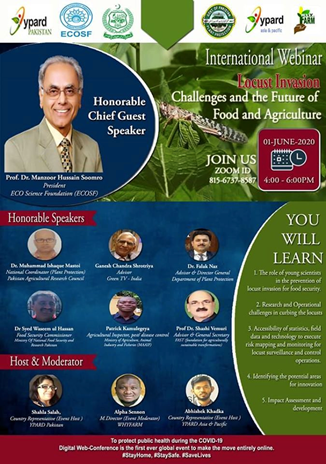ECOSF and YPARD organize a joint Webinar on Locust Invasion – Challenges and the Future of Food and Agriculture
Go Back

 ECOSF and Young Professionals in Agricultural Research and Development (YPARD) in collaboration with Pakistan Agricultural Research Council (PARC), Ministry of National Food Security and Research (MNFSR) Pakistan, YPARD Asia & Pacific Group and Why Farm Agricultural Organization organized a webinar on “Locust Invasion – Challenges and the Future of Food and Agriculture” in Pakistan on June 1st, 2020.
ECOSF and Young Professionals in Agricultural Research and Development (YPARD) in collaboration with Pakistan Agricultural Research Council (PARC), Ministry of National Food Security and Research (MNFSR) Pakistan, YPARD Asia & Pacific Group and Why Farm Agricultural Organization organized a webinar on “Locust Invasion – Challenges and the Future of Food and Agriculture” in Pakistan on June 1st, 2020.
The objective of hosting this webinar was to discuss the challenges of the worst locust outbreak in decades that has devastated the agriculture crops and pastures in many countries in Africa, Middle East and the Indo-Pak Subcontinent. The webinar provided an opportunity for experts to review and discuss possible action plan for locust surveillance for effective control operations.
On behalf of YPARD Pakistan Chapter, Ms. Shahla Salah opened the webinar and presented her welcome note. Mr. Alpha Senon, Why Farm Agricultural Organization moderated the session. President ECOSF Prof. Dr. Manzoor Hussain Soomro was the Chief Guest speaker and presented the status of locust invasion in the ECO Member Countries; Iran and Pakistan.
In his speech, Prof. Soomro called for drastic measures to contain the locust invasion, and if it is not contained in an appropriate response, the impact on crops and vegetation will drive up hunger in regions already struggling with high levels of food insecurity, he said. Prof. Soomro further shared that the desert locust upsurge is threatening food security, nutrition and livelihoods as well as environmental and economic development in Pakistan and Iran.
The situation in both countries is of particular concern given the multiple risks the region is already facing, including the heavy impact of COVID-19, he added. Prof Soomro stressed that desert locust control is indeed an international responsibility, because locusts breed and move over wide areas so that events in one country rapidly affect events in others. Prof. Soomro concluded that improved coordination among the government agencies, FAO-UN and planning for potential locust outbreaks and control actions are very vital.
Later during the webinar, Dr. Muhammad Ishaque Mastoi National Coordinator (Plant Protection) PARC, Dr. Mohammad Ziauddin, Senior Entomologist President, Agri-Watch Society of Pakistan, and Dr. Falak Naz Advisor & Director General - Department of Plant Protection Ministry of National Food Security and Research Pakistan, including other experts also spoke and contributed to the webinar and shared their expert opinion.